Imagine this: You, nestled into your favourite cozy nook, cradling a steaming cup of your cherished tea, its exquisite aroma enveloping you like a warm embrace. As you take that first sip, you’re likely anticipating a delightful flavour, but did you know that your cup of tea holds a treasure trove of health benefits waiting to be uncovered?
Exploring The World Of Tea
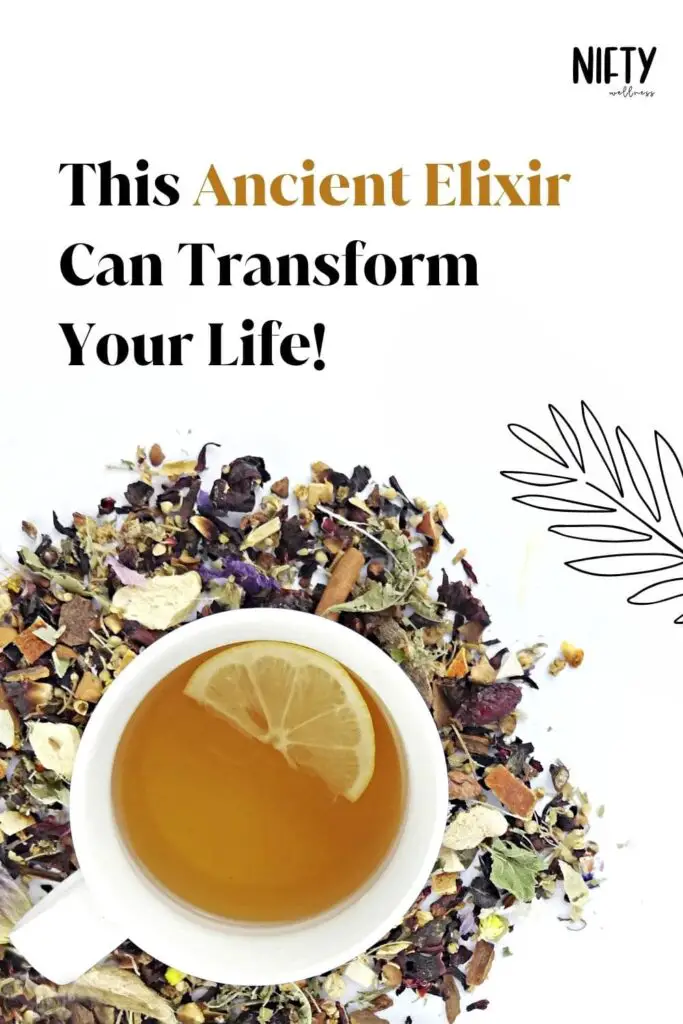
As the world’s second most-consumed drink after water, tea boasts a history of medicinal use over 3,000 years. From the time-honoured tea groves of Yunnan to modern, flavour-infused blends, tea has been cherished for its calming effects and capacity to enhance your overall health.
Let us enter the world of tea, where each sip can take us toward a more wholesome and joyful experience.
Health Benefits of Tea: What’s Brewing?
Unlike other beverages, tea is available in multiple forms. Each variety offers a unique flavour profile along with various potential health benefits. Whether you find comfort in the brisk aroma of green tea, savour the velvety richness of milk tea, or prefer timeless classics like black, white, or herbal infusions, there’s a tea to suit every taste.
It wouldn’t be a hyperbole to say there is a world of delightful possibilities with tea. From the boldness of black tea to the tranquility of herbal blends, there’s a tea for everyone’s palate. But there’s more to tea than its delicious flavors. Now comes the big question: What are the benefits of drinking tea? Let’s delve deeper into the captivating world of tea, exploring its remarkable health benefits. Here are seven reasons you should make tea your cup of tea!
Antioxidant Powerhouse
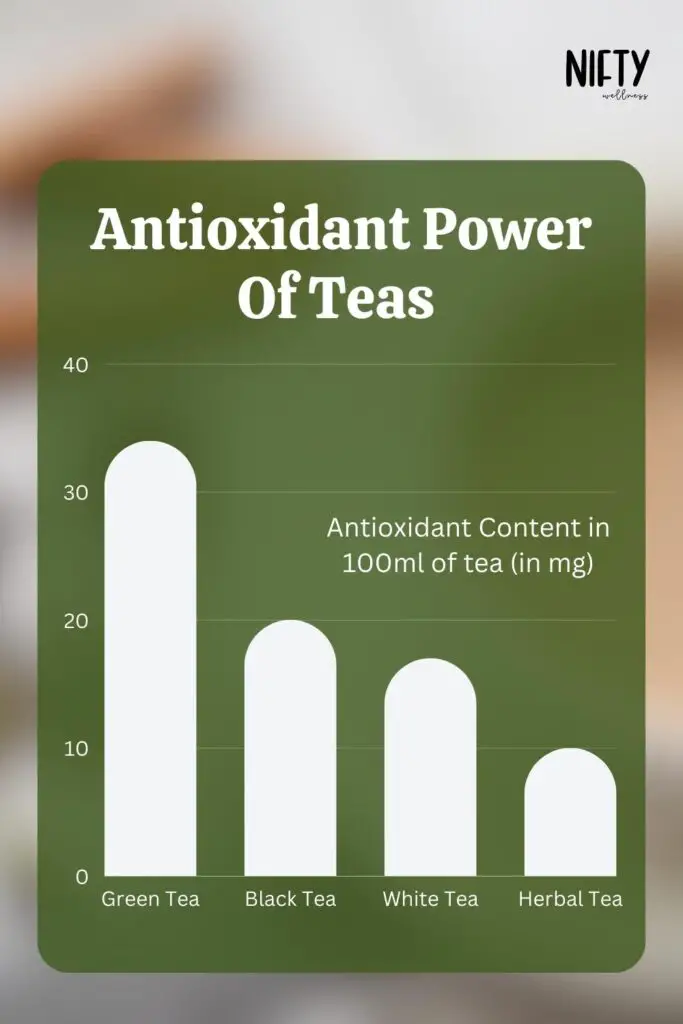
Whether robust black, vibrant green, delicate white, or soothing herbal, tea is packed with tiny but mighty warriors called polyphenols. Think of them as your body’s loyal bodyguards, defending against diseases like cancer and heart conditions. With each sip, you’re strengthening your body’s defenses.
Immune System Booster
Tea comes to the rescue of your immune system with its catechins, which are like trusty allies. As you sip your tea, these catechins tirelessly bolster your defenses. Say goodbye to those pesky colds and flu; you’re on the path to better health with every cup.
Heart-Healthy Brew
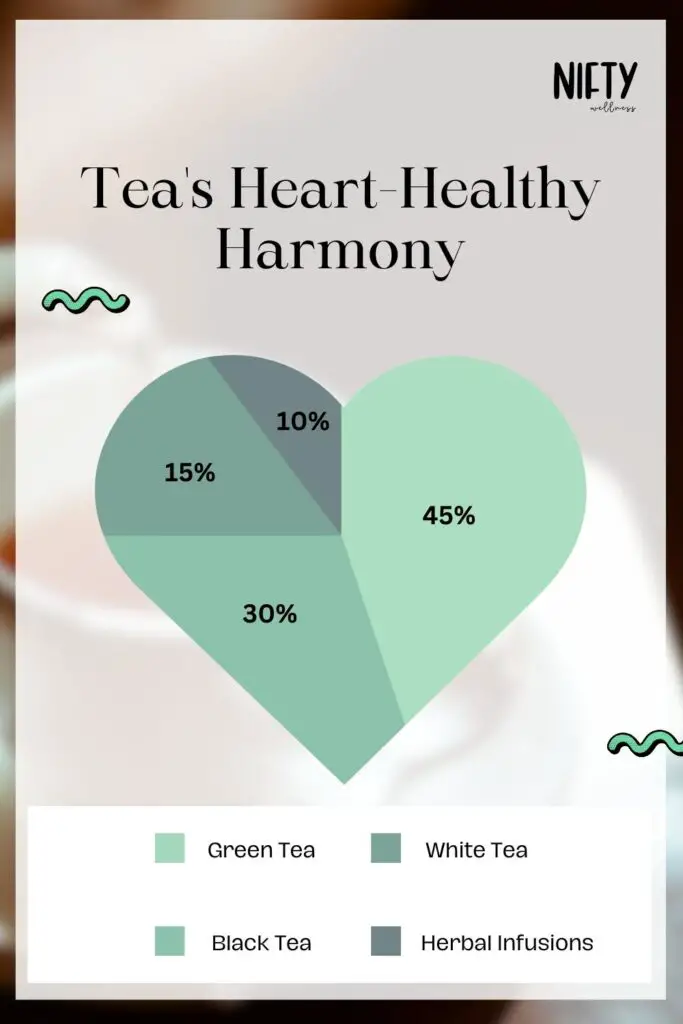
Scientific research stands firmly behind the heart-healthy benefits of green and black teas. These teas are like Cupid’s arrows for your heart, reducing bad cholesterol levels and helping to maintain healthy blood pressure. They even enhance the function of your blood vessels. So, if you cherish your heart, remember to cherish your tea!
Serenity in a Cup
Beyond its physical perks, tea is an elixir for your mind. Consider varieties like chamomile and mint as nature’s tranquilizers. They contain natural compounds that work like a comforting embrace, soothing away stress and anxiety. Meanwhile, L-theanine, another tea ingredient, is a gentle guide to mental clarity and relaxation. It’s like a moment of calm on a bustling day.
Shedding Pounds with Tea
Green tea can be your secret weapon in your weight management journey. It’s like having a supportive coach in your cup, gently nudging your metabolism and aiding your body in burning fat more efficiently. While it won’t deliver instant results, it acts as a catalyst for your weight loss efforts.
Hydration and Detoxification
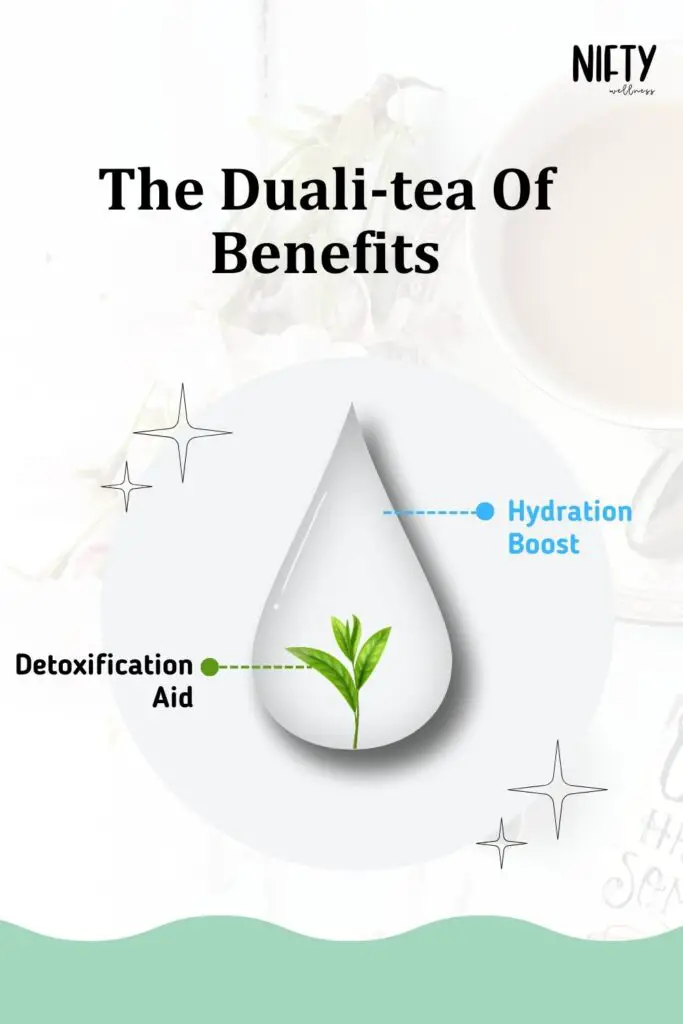
Consider tea a flavourful drink and a hydration hero. And certain herbal teas, like dandelion and nettle, go above and beyond. They lend a hand to your body’s natural detoxification process, helping you flush out toxins. So, with every sip, you’re staying hydrated and giving your body a detox treat.
Brewing Wellness with Saffron Tea
Saffron tea is often called the golden elixir due to its multi-faceted benefits. It’s not just a beverage; it’s a sip of pure wellness. Whether you want to elevate your mood or seek relief from PMS symptoms, saffron tea is what you need! If you think that is all, wait till you hear this! Saffron tea is excellent at weight management and provides generous antioxidants, too. In short, saffron tea is a well-rounded powerhouse.
Possible Side Effects of Tea
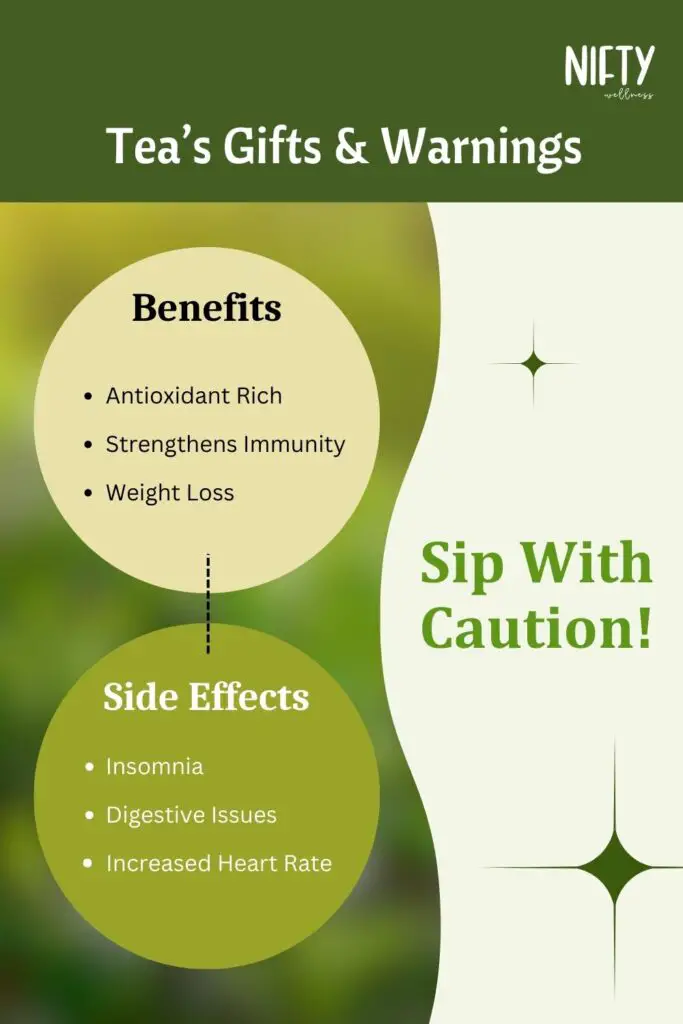
While we have discussed various health benefits of tea, excessive consumption may be risky. Too much of anything is harmful, but specific side effects can be seen when it comes to teas, especially highly caffeinated teas. Read on to discover common side effects associated with excessive tea consumption:
Insomnia
When you indulge in numerous cups of caffeinated tea, especially in the evening or close to bedtime, caffeine can interfere with your sleep patterns. It might become challenging to fall asleep and stay asleep, leading to disrupted rest. Excessive tea consumption later in the day might lead to insomnia in some people.
Digestive Issues
Tea on an empty stomach can sometimes work like a double-edged sword. While it provides warmth and comfort, it can trigger digestive discomfort for some. People might experience mild stomach aches, bloating, or, in some cases, acid reflux. To ensure you do not get upset, avoid having tea on an empty stomach and always complement it with a meal or a light snack.
Increased Heart Rate
As a natural stimulant, tea’s caffeine provides many an energy boost. However, it can also lead to a temporary spike in heart rate. Some people may feel jittery or anxious due to this effect. Be mindful of your caffeine tolerance and opt for decaffeinated tea if you’re sensitive to its stimulating properties.
It is important to emphasize that these side effects are typically linked to excessive tea intake. Enjoying tea in moderation, considering your tolerance to caffeine, and being mindful of the timing of consumption can help you reap the many benefits of drinking tea without experiencing these drawbacks.
Beyond Tea: A World of Herbal Tisanes
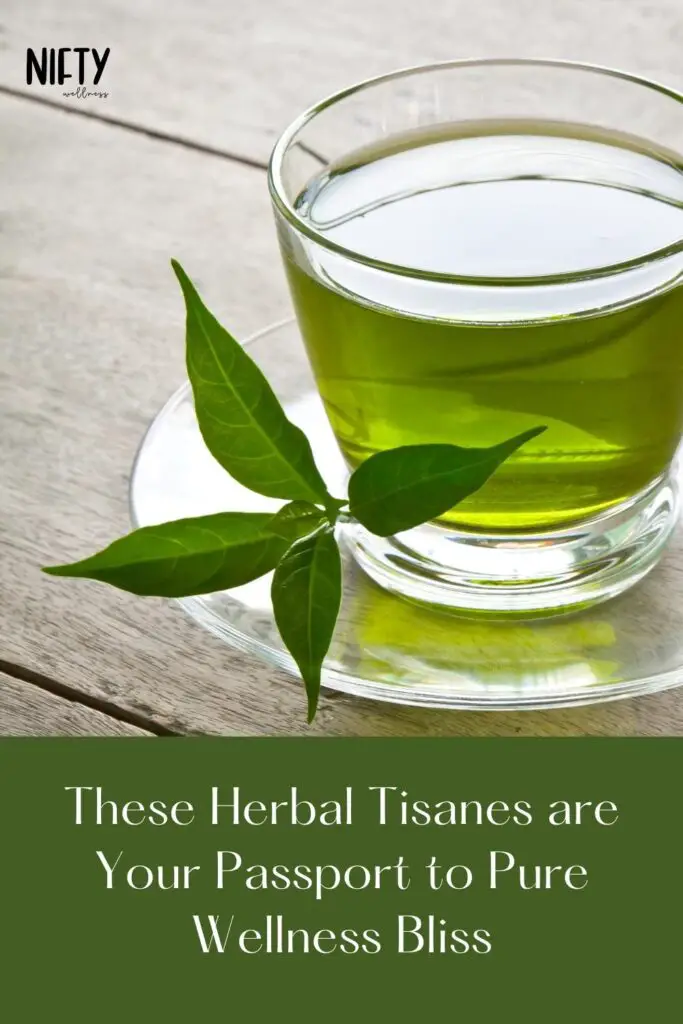
When we talk about teas, it is impossible to skip herbal tisanes! Let’s step into the world of herbal tisanes, where crafting diverse blends from herbs, flowers, and roots takes center stage. While these tisanes are not “true” teas in the traditional sense, these herbal concoctions contribute significantly to your overall well-being.
If you think you know everything about tea now, let it be known that we have only scratched the surface so far! A vast universe of tea-related knowledge and experiences is waiting to be uncovered. Dive into the world of green teas by exploring our blog post on the Best Japanese Green Teas and How To Brew Them.
As you navigate this intricate universe of teas, you’ll find that its influence extends far beyond the seven health benefits of drinking tea everyday mentioned earlier. There’s an uncharted territory of knowledge and experiences waiting just for you.
One such experience is tea meditation, and a simple cup of tea that can elevate your mindfulness. Discover its boundless benefits in our blog post on Tea Meditation: Finding Tranquility In Every Sip.
Want to know where to start this tea-tasting expedition from? Waste no time and delve into our Top 9 Japanese Green Tea Brands & Green Tea Benefits article. It’s your gateway to a world of serenity and well-being.
So, dear tea enthusiast, fasten your seatbelt and get ready for an odyssey through the captivating universe of tea. With each hot cup, you’re savouring flavours and nurturing your body and mind. It’s a journey of well-being, one sip at a time. Just take a moment, indulge in your favourite tea, and let its goodness embrace you.
Frequently Asked Questions (FAQs)
Can I replace water with tea for hydration?
Yes, you can replace water with tea for hydration to some extent. Tea does provide water content, but it also contains compounds like caffeine that can have a mild diuretic effect, causing increased urination. So, while it can contribute to your daily fluid intake, it’s essential to balance tea with water to ensure adequate hydration, especially if you’re sensitive to caffeine.
Is there a specific time of day to drink tea for maximum benefits?
There isn’t a specific time of day to drink tea for maximum benefits that applies universally. It largely depends on the type of tea and your personal preferences. Generally, green tea is often enjoyed in the morning for a gentle caffeine boost, while herbal teas like chamomile are favoured before bedtime for their relaxing properties. However, you can drink tea throughout the day as per your needs.
How should I store tea to maintain its freshness?
For optimal tea freshness, follow these tips: Keep your tea in a sealed container, preferably airtight. Store it in a cool, dark place, away from humidity and strong odours, which can compromise the flavour. Avoid temperature fluctuations by not placing it near heat sources or in the fridge. Also, separate teas with distinct scents to prevent flavour mingling. Following these guidelines helps maintain your tea’s delightful flavour and aroma over time.
Can children safely consume tea?
Tea contains caffeine, which can affect children differently than adults. Excessive caffeine intake can lead to sleep disturbances, nervousness, and other side effects in children. Children should generally consume herbal teas or caffeine-free varieties to enjoy tea. Consult a pediatrician for personalized guidance based on the child’s age and specific health considerations.
Is milk tea good for health?
Milk tea offers various health benefits, such as calcium and antioxidants. However, it often contains added sugars and can be calorie-dense, which might not be suitable for those aiming to manage their sugar or calorie intake. Opting for unsweetened or lightly sweetened versions and using low-fat or plant-based milk can make milk tea a healthier choice. Moderation is key to enjoying its benefits without excessive sugar or calories.
